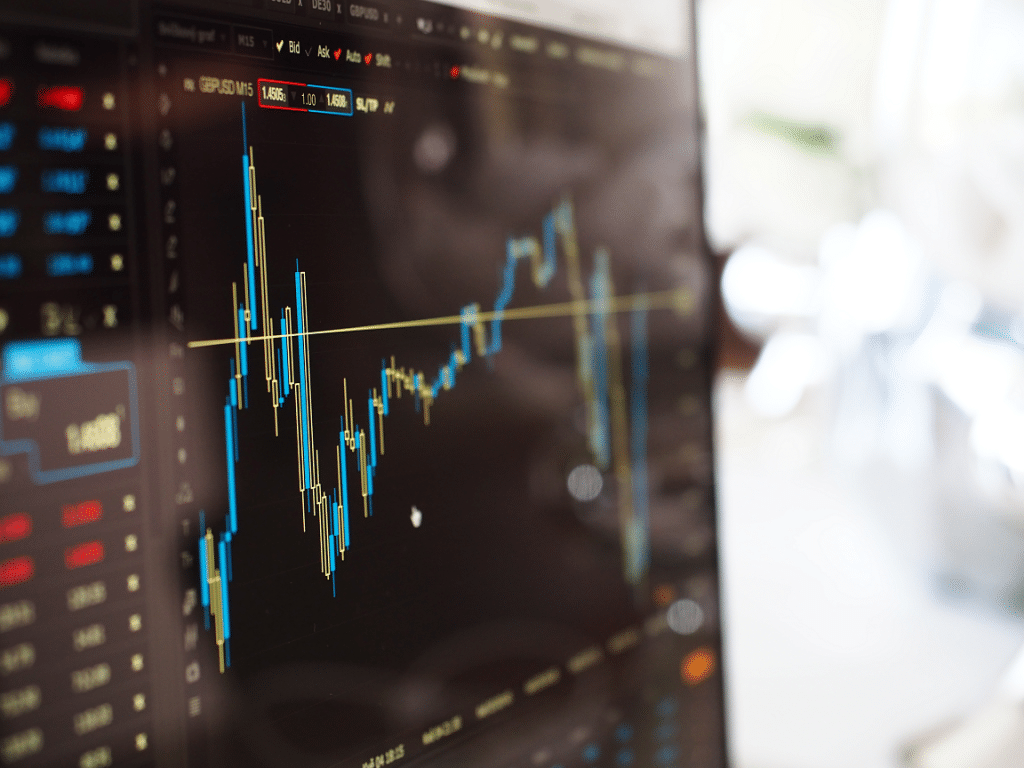As spread betting allows you to bet on whether a price is going to fall or rise you will be given a quote from your spread betting broker. This comprises a “sell” price and a “buy” price.
As an example, if your provider offers a share at a price of 205/206, the left value is its sell price and the right value is its buy price. Should you believe the market will rise, you “go long” or bet on “buy”. On the other hand, if you believe the market is going to fall, you “go short”, or place a bet on “sell”.
After deciding which way you are going to bet, you then need to choose how much you are going to commit to the trade per point of movement in the market.
A pip, or point, is the measurement of the price movement, with its value depending on the asset type. In the case of equities, for example, one point tends to equate to 1p, however with indices, usually 1 point equals one point in the index value.
After placing the bet, the further the market goes in the direction you selected, the more money you will make from the trade. Inversely, the more the market moves against you the more you lose.
However, if the market moves in your favour, you have to overcome the spread – a part of the cost required to open a trade.
Diversification – a basic premise for trading
The best traders in the world only get it right about half the time, most traders admit to being right about 55% of the time. But what makes the right trades right is that there are enough of them to run the wins and cut the losses. Traders need to look at as many trends and momentum charts as possible. A good diversified set of open positions against asset classes such as commodities, FX, indices and stocks should provide a bit of protection against economic indicators and external factors influencing price.
- Related guide: Can you use shares in your portfolio as collateral for CFD trading and spread betting?
Once the positions (say ten or so) are open you should be able to tell in your open profit and loss section what traders are winning and what trades are loosing. When you call a trend correct run it, when you have called it wrong cut it. The skill is in closing positions, not opening them. A profitable position can go on to generate far more profits than ten small losses.
Risk management – using stops and limits
As above one of the greatest demises of any trader is not cutting a loss. Traders live in hope that they will eventually be proved right and it is essential that realism is exercised. Traders get it wrong and using stops to automatically cut a bad position takes the emotion out of the game. Set yourself an amount you are prepared to lose on each trade and stick to it.
What Can You Spread Bet On?
Depending on which spread betting company you choose, it’s possible to speculate on thousands of different markets such as commodities, forex, shares, bonds, interest rates and indices. Let’s explore what’s involved in trading these various markets.
Index spread betting
When people refer to “the markets”, usually it is an index they are referring to. Indices measure the changes observed in a particular selection of stocks which represent a specific market (or part of it). If you trade indices, you can speculate on the overall market’s performance and due to this, usually indices reflect the sentiment of investors about a certain region, sector or economy’s state.
Compare the best brokers for trading indices here
If traders trade indices, they can develop a more diverse portfolio, speculating on either the contraction or growth of a number of industries worldwide. Index trading can also be used for taking a broad view of several companies and can reduce the risks associated with trading separate individual shares.
Some of the most popular indices for trading include:
- The New York Stock Exchange
- The S&P 500 (made up of the USA’s 500 biggest companies)
- The Dow Jones Industrial Average (made up of the USA’s 30 most influenced and largest companies)
- The NASDAQ Composite Index (an exchange focused on technology)
- Nikkei 225
- FTSE 100
Forex spread betting
The Forex global market is the biggest financial market in the world, with up to $4 trillion of trades being placed each day. Forex spread betting refers to trading currency pairs to speculate which will go up in value when compared to the other. Open 24 hours, five days per week, the global Forex Market is very liquid and offers potential to achieve huge profits.
How does forex spread betting work?
- Currencies are always traded in pairs. The base currency is the first of the pair and the second is the quote or counter currency
- Every Forex quote has two parts – the bid and the ask price. The term “bid” refers to the price which the broker will buy the base currency for in return for the chosen counter currency. The term “ask” refers to the price which the broker will sell the chosen base currency for in return for the chosen counter currency
- The term “spread” refers to the difference between the ask and the bid and this determines the position’s cost to open
- A major currency pair will be usually quoted to 4 decimal places. A pip or point is the final digit of this quote, so, if you were looking for a quote on EUR/USD and the bid price was 1.0661 and the ask price was 1.0664, there would be a spread of 3 pips. This cost must be redeemed from the traders’ profits and therefore the market must move favourably in order to just break even
When you trade shares, the price is fixed, however this is not the case when trading currency pairs. Currency quotes will differ between the various brokers and banks. The reason for this is that Forex is an OTC (over the counter) market, with no physical point of central exchange. Therefore, it is not as regulated as the stock market. Since there can be variations in bid-ask spreads between providers, you need to take the time to compare spread betting brokers before you commit to the one which offers you the optimal spreads to suit your trades.
Spread betting on forex enables investors to trade 24 hours a day, 5 days per week as there is no centralized physical exchange to have set closing hours. That means that when you are told the US$ closed at a certain rate, that rate refers to the time at which the New York stock market closed, but spread bettors and traders are still able to trade in Forex after the stock markets close, which is very difficult to trading shares.
You need to be aware of the various terms which are used in this form of trading.
For example, if you trade a currency pair, one currency is long and the other is short. This means if you’re selling 100,000 units (standard lot) of EUR/USD, you are exchanging Euros (EUR) for Dollars (USD). The dollars are “long” and the Euros are “short” in this scenario.
It often helps when you think of some exchanges that you carry out every day. Imagine you have purchased 4 apples for £1 in a supermarket, you are then short £1, but long 4 apples. This principle also works when applied to Forex although there is no physical exchange.
Commodities spread betting
A commodity is a tradable raw material or a primary agricultural product. The commodities which are most commonly traded include precious metals like gold and silver, agricultural products like beef, sugar, coffee, barley, gas and oil.
There are several ways of classifying commodities. A soft commodity is one which is bred or grown (like oats or cattle) while a hard commodity is one which is extracted such as aluminium or copper. Sometimes, commodities are classified in categories like:
- Energy – gasoline, heating oil, natural gas and oil
- Metals – aluminium, platinum, copper, gold and silver
- Agriculture – sugar, wheat, rice, cocoa and coffee
- Livestock and Meat – feeder and live cattle
Usually, commodity trades are carried out via futures contracts on an exchange which standardises the minimum quality and quantity of the communities being traded. As a future is a contract to sell or buy the asset, should the trader fail to close their position before it expires, a large delivery of a commodity that the trader neither wants or needs could end up being the result.
When you’re a spread bettor, however, you won’t need to worry about this eventuality. You are just speculating on the asset’s movement, not actually purchasing the future. Your provider, however, will always ensure that the situation never occurs by closing the trade before it expires.
Typically, the commodity market follows supply & demand, with lower supply leading to a higher price. The price of commodities can be affected by numerous elements including weather patterns, advances in technology, wars, health epidemics and developments in the global economy.
Shares spread betting
A share is a piece of a company ownership which may be purchased and sold via financial stock markets such as the New York or London stock exchanges. The value of shares is determined by supply and demand, and this can be primarily affected by the performance (or the perceived performance) of the company by its investors. If the company, for example, reports to its investors that they have had an especially successful quarter, their share prices usually rise. But if the same company issues profit warnings, or is implicated as being involved in some kind of scandal, it’s likely their share price will fall.
As every share belongs to one specific company instead of being focused on the economic status of a country or whole industry (as is the case if you choose to spread bet on Forex or indices), when you trade shares it’s possible to research in a more focused way about the company which you believe will increase its value.
Spread betting gives traders the ability to speculate on many thousands of different shares across a variety of shares markets around the globe.
Bond spread betting
A bond is an interest or debt bearing instrument which can be traded and represent one way for governments and companies to raise sufficient money so that they are able to pay for their investments.
Should any future change to long term rate of interest be something that interests you, it could be worth trying to speculate on bonds. A lot of investors choose to include bonds in their investment portfolio since they have a reputation for stability and safety when compared to stock market trades. Some investors also choose to trade in bonds as a way of hedging against any pre-existing government bond holdings.
The majority of spread betting brokers will offer a good selection of government bonds from around the globe for investors to try speculating on. Usually, these include all of the main categories of international bonds like 10 Year Treasury Notes, U.S. Treasury Bonds and UK Gilts.

Richard is the founder of the Good Money Guide (formerly Good Broker Guide), one of the original investment comparison sites established in 2015. With a career spanning two decades as a broker, he brings extensive expertise and knowledge to the financial landscape.
Having worked as a broker at Investors Intelligence and a multi-asset derivatives broker at MF Global (Man Financial), Richard has acquired substantial experience in the industry. His career began as a private client stockbroker at Walker Crips and Phillip Securities (now King and Shaxson), following internships on the NYMEX oil trading floor in New York and London IPE in 2001 and 2000.
Richard’s contributions and expertise have been recognized by respected publications such as The Sunday Times, BusinessInsider, Yahoo Finance, BusinessNews.org.uk, Master Investor, Wealth Briefing, iNews, and The FT, among many others.
Under Richard’s leadership, the Good Money Guide has evolved into a valuable destination for comprehensive information and expert guidance, specialising in trading, investment, and currency exchange. His commitment to delivering high-quality insights has solidified the Good Money Guide’s standing as a well-respected resource for both customers and industry colleagues.
You can contact Richard at richard@goodmoneyguide.com




